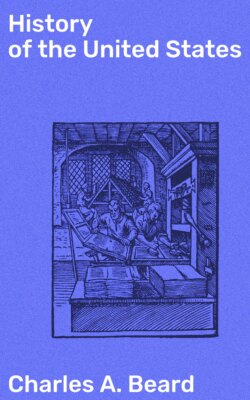Читать книгу History of the United States - Charles A. Beard - Страница 27
На сайте Литреса книга снята с продажи.
The Colonial Press
ОглавлениеTable of Contents
The Rise of the Newspaper.—The evolution of American democracy into a government by public opinion, enlightened by the open discussion of political questions, was in no small measure aided by a free press. That too, like education, was a matter of slow growth. A printing press was brought to Massachusetts in 1639, but it was put in charge of an official censor and limited to the publication of religious works. Forty years elapsed before the first newspaper appeared, bearing the curious title, Public Occurrences Both Foreign and Domestic, and it had not been running very long before the government of Massachusetts suppressed it for discussing a political question.
Publishing, indeed, seemed to be a precarious business; but in 1704 there came a second venture in journalism, The Boston News-Letter, which proved to be a more lasting enterprise because it refrained from criticizing the authorities. Still the public interest languished. When Franklin's brother, James, began to issue his New England Courant about 1720, his friends sought to dissuade him, saying that one newspaper was enough for America. Nevertheless he continued it; and his confidence in the future was rewarded. In nearly every colony a gazette or chronicle appeared within the next thirty years or more. Benjamin Franklin was able to record in 1771 that America had twenty-five newspapers. Boston led with five. Philadelphia had three: two in English and one in German.
Censorship and Restraints on the Press.—The idea of printing, unlicensed by the government and uncontrolled by the church, was, however, slow in taking form. The founders of the American colonies had never known what it was to have the free and open publication of books, pamphlets, broadsides, and newspapers. When the art of printing was first discovered, the control of publishing was vested in clerical authorities. After the establishment of the State Church in England in the reign of Elizabeth, censorship of the press became a part of royal prerogative. Printing was restricted to Oxford, Cambridge, and London; and no one could publish anything without previous approval of the official censor. When the Puritans were in power, the popular party, with a zeal which rivaled that of the crown, sought, in turn, to silence royalist and clerical writers by a vigorous censorship. After the restoration of the monarchy, control of the press was once more placed in royal hands, where it remained until 1695, when Parliament, by failing to renew the licensing act, did away entirely with the official censorship. By that time political parties were so powerful and so active and printing presses were so numerous that official review of all published matter became a sheer impossibility.
In America, likewise, some troublesome questions arose in connection with freedom of the press. The Puritans of Massachusetts were no less anxious than King Charles or the Archbishop of London to shut out from the prying eyes of the people all literature "not mete for them to read"; and so they established a system of official licensing for presses, which lasted until 1755. In the other colonies where there was more diversity of opinion and publishers could set up in business with impunity, they were nevertheless constantly liable to arrest for printing anything displeasing to the colonial governments. In 1721 the editor of the Mercury in Philadelphia was called before the proprietary council and ordered to apologize for a political article, and for a later offense of a similar character he was thrown into jail. A still more famous case was that of Peter Zenger, a New York publisher, who was arrested in 1735 for criticising the administration. Lawyers who ventured to defend the unlucky editor were deprived of their licenses to practice, and it became necessary to bring an attorney all the way from Philadelphia. By this time the tension of feeling was high, and the approbation of the public was forthcoming when the lawyer for the defense exclaimed to the jury that the very cause of liberty itself, not that of the poor printer, was on trial! The verdict for Zenger, when it finally came, was the signal for an outburst of popular rejoicing. Already the people of King George's province knew how precious a thing is the freedom of the press.
Thanks to the schools, few and scattered as they were, and to the vigilance of parents, a very large portion, perhaps nearly one-half, of the colonists could read. Through the newspapers, pamphlets, and almanacs that streamed from the types, the people could follow the course of public events and grasp the significance of political arguments. An American opinion was in the process of making—an independent opinion nourished by the press and enriched by discussions around the fireside and at the taverns. When the day of resistance to British rule came, government by opinion was at hand. For every person who could hear the voice of Patrick Henry and Samuel Adams, there were a thousand who could see their appeals on the printed page. Men who had spelled out their letters while poring over Franklin's Poor Richard's Almanac lived to read Thomas Paine's thrilling call to arms.
